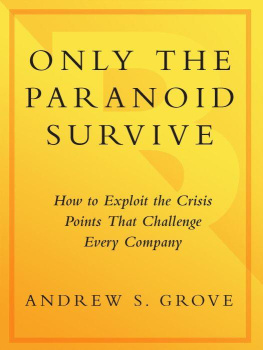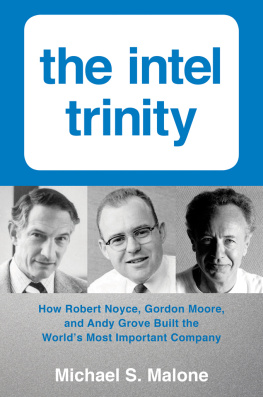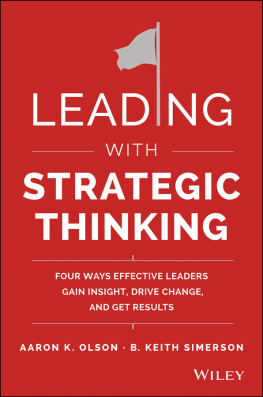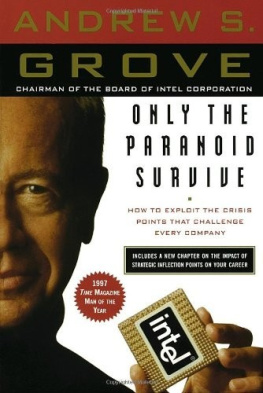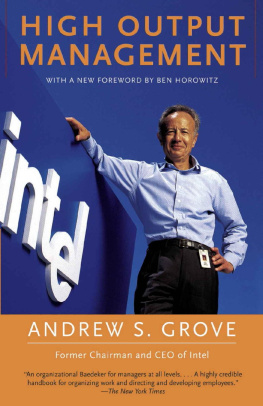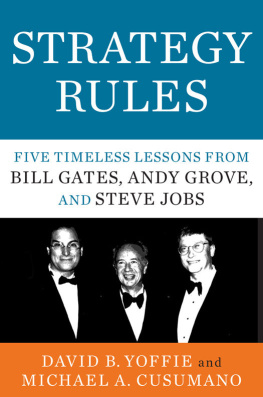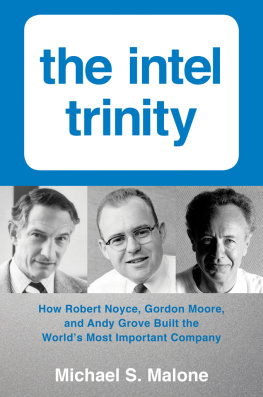Other books by Andrew S. Grove
High Output Management
One-on-One with Andy Grove
Physics and Technology of Semiconductor Devices
But in capitalist reality, as distinguished from its textbook picture, it is not (price) competition which counts but the competition from the new commodity, the new technology, the source of supply, the new type of organization competition which strikes not at the margins of the existing firms but at their foundations and their very lives.
Joseph A. Schumpeter,
Capitalism, Socialism and Democracy, 1942
Contents
Chapter 1:
Chapter 2:
Chapter 3:
Chapter 4:
Chapter 5:
Chapter 6:
Chapter 7:
Chapter 8:
Chapter 9:
Chapter 10:
Acknowledgments
The ideas of this book have their origin in two sets of experiences. First and foremost, they are based on my years in management roles at Intel, during which I have experienced a number of strategic inflection points. Second, for the last five years, I have cotaught a course in strategic management at the Stanford University Graduate School of Business where, through the eyes of my students, I got to relive some of my experiences, as well as the experiences of others. The first represents a kind of in vivo lesson about managing change; the second, its in vitro counterpart.
Correspondingly, my thanks go to those who worked alongside me: my fellow managers at Intel and my students at Stanford. Special thanks go to my coteacher, Professor Robert Burgelman, who, in addition to being my mentor in the art of case teaching, helped me clarify and amplify many of my thoughts.
I had no intention of writing a book on this subject until Harriet Rubin, from Doubleday, sought me out and convinced me that I should do so. Her understanding of the subject, her insistence on clarity and her elaboration of the basic ideas have been very helpful in the development of the manuscript.
Thanks are due to Robert Siegel for his unceasing efforts in locating source reference material for many of my examples, reference material for the notes in the back of this book, and for his nitpicky eyes that ferreted out numerous errors and inconsistencies.
The most significant credit goes to Catherine Fredman, who helped me throughout the long process of transforming a precis into a book. Her understanding of my subject matter, her ability to follow my thought processes, and her incredible organizational skills were immensely valuable. Particularly helpful were her insights into the parallels between individuals careers and corporate strategy. And her sense of humor has helped me skirt many a pothole.
Lastand definitely not leastmy gratitude goes to my wife, Eva, who did double duty. She supported me through decades of navigating changes, many of them quite profound and correspondingly capable of taking their toll. Then she supported me again as I relived some of these events in the pages of this bookand she even helped make sure that my text is clear.
Santa Clara
February 1996
Preface
Only the Paranoid Survive
Sooner or later,
something
fundamental in your
business world
will change.
I m often credited with the motto, Only the paranoid survive. I have no idea when I first said this, but the fact remains that, when it comes to business, I believe in the value of paranoia. Business success contains the seeds of its own destruction. The more successful you are, the more people want a chunk of your business and then another chunk and then another until there is nothing left. I believe that the prime responsibility of a manager is to guard constantly against other peoples attacks and to inculcate this guardian attitude in the people under his or her management.
The things I tend to be paranoid about vary. I worry about products getting screwed up, and I worry about products getting introduced prematurely. I worry about factories not performing well, and I worry about having too many factories. I worry about hiring the right people, and I worry about morale slacking off.
And, of course, I worry about competitors. I worry about other people figuring out how to do what we do better or cheaper, and displacing us with our customers.
But these worries pale in comparison to how I feel about what I call strategic inflection points.
Ill describe what a strategic inflection point is a bit later in this book. For now, let me just say that a strategic inflection point is a time in the life of a business when its fundamentals are about to change. That change can mean an opportunity to rise to new heights. But it may just as likely signal the beginning of the end.
Strategie inflection points can be caused by technological change but they are more than technological change. They can be caused by competitors but they are more than just competition. They are full-scale changes in the way business is conducted, so that simply adopting new technology or fighting the competition as you used to may be insufficient. They build up force so insidiously that you may have a hard time even putting a finger on what has changed, yet you know that something has.
Lets not mince words: A strategic inflection point can be deadly when unattended to. Companies that begin a decline as a result of its changes rarely recover their previous greatness.
But strategic inflection points do not always lead to disaster. When the way business is being conducted changes, it creates opportunities for players who are adept at operating in the new way. This can apply to newcomers or to incumbents, for whom a strategic inflection point may mean an opportunity for a new period of growth.
You can be the subject of a strategic inflection point but you can also be the cause of one. Intel, where I work, has been both. In the mid-eighties, the Japanese memory producers brought upon us an inflection point so overwhelming that it forced us out of memory chips and into the relatively new field of microprocessors. The microprocessor business that we have dedicated ourselves to has since gone on to cause the mother of all inflection points for other companies, bringing very difficult times to the classical mainframe computer industry. Having both been affected by strategic inflection points and having caused them, I can safely say that the former is tougher.
Ive grown up in a technological industry. Most of my experiences are rooted there. I think in terms of technological concepts and metaphors, and a lot of my examples in this book come from what I know. But strategic inflection points, while often brought about by the workings of technology, are not restricted to technological industries.
The fact that an automated teller machine could be built has changed banking. If interconnected inexpensive computers can be used in medical diagnosis and consulting, it may change medical care. The possibility that all entertainment content can be created, stored, transmitted and displayed in digital form may change the entire media industry. In short, strategic inflection points are about fundamental change in any business, technological or not.
We live in an age in which the pace of technological change is pulsating ever faster, causing waves that spread outward toward all industries. This increased rate of change will have an impact on you, no matter what you do for a living. It will bring new competition from new ways of doing things, from corners that you dont expect.
It doesnt matter where you live. Long distances used to be a moat that both insulated and isolated people from workers on the other side of the world. But every day, technology narrows that moat inch by inch. Every person in the world is on the verge of becoming both a coworker and a competitor to every one of us, much the same as our colleagues down the hall of the same office building are. Technological change is going to reach out and sooner or later change something fundamental in your business world.
Next page
